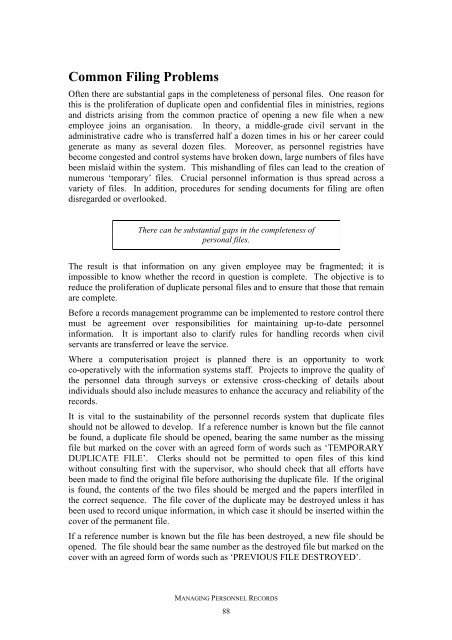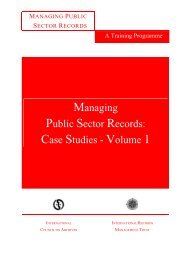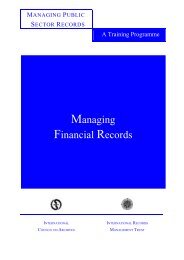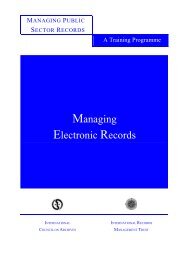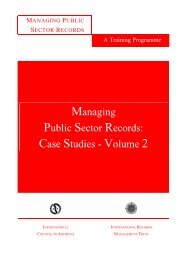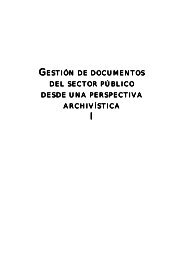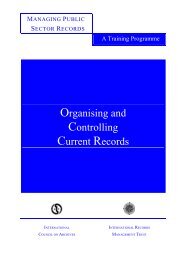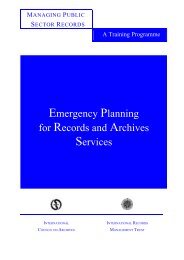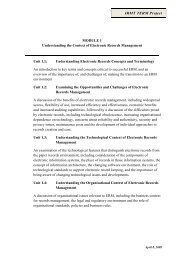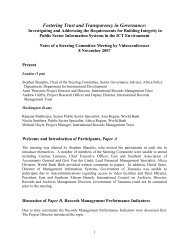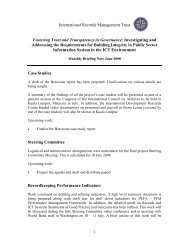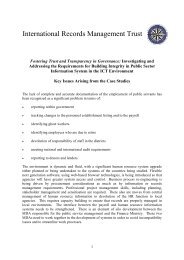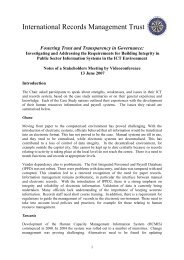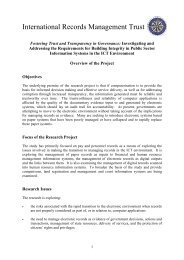Managing Personnel Records - International Records Management ...
Managing Personnel Records - International Records Management ...
Managing Personnel Records - International Records Management ...
Create successful ePaper yourself
Turn your PDF publications into a flip-book with our unique Google optimized e-Paper software.
Common Filing Problems<br />
Often there are substantial gaps in the completeness of personal files. One reason for<br />
this is the proliferation of duplicate open and confidential files in ministries, regions<br />
and districts arising from the common practice of opening a new file when a new<br />
employee joins an organisation. In theory, a middle-grade civil servant in the<br />
administrative cadre who is transferred half a dozen times in his or her career could<br />
generate as many as several dozen files. Moreover, as personnel registries have<br />
become congested and control systems have broken down, large numbers of files have<br />
been mislaid within the system. This mishandling of files can lead to the creation of<br />
numerous ‘temporary’ files. Crucial personnel information is thus spread across a<br />
variety of files. In addition, procedures for sending documents for filing are often<br />
disregarded or overlooked.<br />
There can be substantial gaps in the completeness of<br />
personal files.<br />
The result is that information on any given employee may be fragmented; it is<br />
impossible to know whether the record in question is complete. The objective is to<br />
reduce the proliferation of duplicate personal files and to ensure that those that remain<br />
are complete.<br />
Before a records management programme can be implemented to restore control there<br />
must be agreement over responsibilities for maintaining up-to-date personnel<br />
information. It is important also to clarify rules for handling records when civil<br />
servants are transferred or leave the service.<br />
Where a computerisation project is planned there is an opportunity to work<br />
co-operatively with the information systems staff. Projects to improve the quality of<br />
the personnel data through surveys or extensive cross-checking of details about<br />
individuals should also include measures to enhance the accuracy and reliability of the<br />
records.<br />
It is vital to the sustainability of the personnel records system that duplicate files<br />
should not be allowed to develop. If a reference number is known but the file cannot<br />
be found, a duplicate file should be opened, bearing the same number as the missing<br />
file but marked on the cover with an agreed form of words such as ‘TEMPORARY<br />
DUPLICATE FILE’. Clerks should not be permitted to open files of this kind<br />
without consulting first with the supervisor, who should check that all efforts have<br />
been made to find the original file before authorising the duplicate file. If the original<br />
is found, the contents of the two files should be merged and the papers interfiled in<br />
the correct sequence. The file cover of the duplicate may be destroyed unless it has<br />
been used to record unique information, in which case it should be inserted within the<br />
cover of the permanent file.<br />
If a reference number is known but the file has been destroyed, a new file should be<br />
opened. The file should bear the same number as the destroyed file but marked on the<br />
cover with an agreed form of words such as ‘PREVIOUS FILE DESTROYED’.<br />
MANAGING PERSONNEL RECORDS<br />
88


